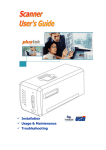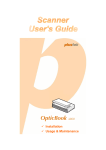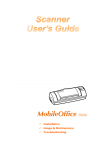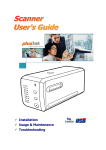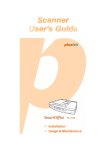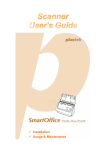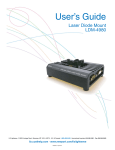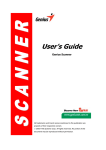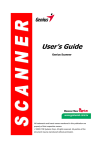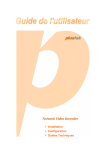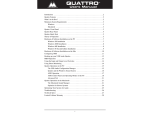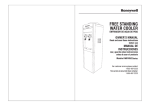Download User Manual
Transcript
© 2009. All rights are reserved. No portion of this document may be reproduced without permission. All trademarks and brand names mentioned in this publication are property of their respective owners. While all efforts have been made to ensure the accuracy of all contents in this manual, we assume no liability for errors or omissions or by statements of any kind in this manual, whether such errors are omissions or statements resulting from negligence, accidents, or any other cause. The contents of this manual are subject to change without notice. The scanning of certain documents, for example checks, bank notes, I.D. cards, government bonds, or public documents, may be prohibited by law and/or subject to criminal prosecution. We recommend you to be responsible and respectful of the copyrights laws when you are scanning books, magazines, journals and other materials. The product is designed and produced to achieve sustainable environmental improvement. We strive to produce products in compliance with global environmental standards. Please consult your local authorities for proper disposal. The product packaging can be recycled. Attention to recycling (For EU country only) Protect your environment! This product should not be thrown into the household waste container. Please give it to the free collecting center in your community. Table of Contents INTRODUCTION ....................................................................................................1 How to Use This Guide............................................................................................... 1 Conventions of This Guide ......................................................................................... 1 A Note about Icons ..................................................................................................... 2 Safety Precautions...................................................................................................... 2 System Requirements ................................................................................................ 2 Box Contents .............................................................................................................. 3 The Scanner’s Features ............................................................................................. 3 Product Information .................................................................................................... 4 CHAPTER I. INSTALLING THE SCANNER....................................................................5 Software Installation Requirements ............................................................................ 5 Hardware Requirements ............................................................................................. 5 Installing and Setting up the Scanner ......................................................................... 5 Step 1. Connecting the Scanner to Your Computer ............................................................. 6 Step 2. Installing the Scanner............................................................................................... 6 Step 3. Testing the Scanner ................................................................................................. 8 Software Setup Troubleshooting ................................................................................ 9 CHAPTER II. USAGE AND MAINTENANCE ............................................................... 10 Operating the Scanner.............................................................................................. 10 Placing Photos with the Protective Sheet ................................................................. 10 DigiPhoto .................................................................................................................. 11 Function Features..................................................................................................... 12 Using the Scanner Button......................................................................................... 13 Status Indicator......................................................................................................... 14 Scanner Connection ................................................................................................. 14 Maintenance ............................................................................................................. 15 Calibrating the Scanner ...................................................................................................... 15 Cleaning the Scanner ......................................................................................................... 15 Usage & Maintenance Tips....................................................................................... 16 APPENDIX A: TROUBLESHOOTING ........................................................................ 17 Scanning Problems................................................................................................... 17 APPENDIX B: SPECIFICATIONS ............................................................................ 20 APPENDIX C: CUSTOMER SERVICE AND WARRANTY ............................................... 21 Statement of Limited Warranty ................................................................................. 21 FCC Radio Frequency Statement............................................................................. 22 CONTACTING PLUSTEK ....................................................................................... 24 Introduction Welcome to the world of Plustek scanners – the ultimate in computer imaging. Your new scanner will improve the professionalism of your day-to-day computing tasks by allowing you to input images and electronic text into your computer system. Like all of our products, your new scanner is thoroughly tested and backed by our reputation for unsurpassed dependability and customer satisfaction. Thank you for choosing us as your scanner supplier. We hope you will continue to turn to us for additional quality products as your computing needs and interests grow. How to Use This Guide This User’s Guide provides instructions and illustrations on how to install and operate your scanner. This guide assumes the user is familiar with Mac operating system. If this is not the case, we suggest you learn more about Mac by referring to your Mac manual before using your scanner. The Introduction section of this manual describes the box contents and minimum computer requirements to use this scanner. Before you start installing your scanner, check the box contents to make sure all parts are included. If any items are damaged or missing, please contact the vendor where you purchased your scanner or our customer service directly. Chapter I describes how to install scanner’s software and connect the scanner to your computer. Note: The scanner connects to your computer through the Universal Serial Bus (USB). If your computer does not support USB technology, you will need to purchase a USB interface card to add USB capabilities to your computer, or buy and install USB connectors if your motherboard has USB capabilities. This guide assumes that your computer is USB-ready and has a free USB port. Chapter II describes how to use, maintain and clean your scanner. Appendix A contains technical support information that can help you solve simple problems. Before calling for help, please read through Appendix A: Troubleshooting. Appendix B contains the Specifications of the scanner you purchased. Appendix C contains our limited warranty agreement and FCC statement concerning the product. Conventions of This Guide Bold — Important note or first use of an important term in a chapter. [XXX] — Represents commands or contents on your computer screen. 1 A Note about Icons This guide uses the following icons to point out information that deserves special attention. Caution Attention Caution: Information that, if not followed, may result in data loss or damage to the product. Pay Special Attention: Instructions that are important to remember and may prevent mistakes. Safety Precautions Before using this device, please read the following important information to eliminate or reduce any possibility of causing damage and personal injury. 1. Moisture condensation may occur inside this device and cause malfunction at these conditions: a. when this device is moved directly from a cold to a warm location; b. after a cold room is heated; c. when this device is placed in a damp room. To avoid the moisture condensation, you are recommended to follow the procedure: 1) Seal this device in a plastic bag for it to adapt to room conditions. 2) Wait for 1-2 hours before removing this device from the bag. 2. Do use the USB cable provided with the scanner. Use of other cable may lead to malfunction. 3. Do not attempt to disassemble the scanner. There is danger of an electrical shock and opening your scanner will void your warranty. 4. Do not subject the scanner to excessive vibration. It may damage the internal components. 5. Unplug the device if you don’t need to use for a certain period of time, such as, during night or long weekend, to avoid any risks of causing fire. System Requirements1 Mac Computer with Intel CPU Mac OS X 10.4 above 1 Higher requirements might be needed when scanning or editing a large quantity of image data. The system requirements here are only a guideline, as in general the better the computer (motherboard, processor, hard disk, RAM, video graphic card), the better the results. 2 CD-ROM Drive 64 MB RAM (128 MB Recommended) 700MB Free Hard Disk Space (800 MB Recommended) USB Port High Color graphic card (VGA or higher) Box Contents2 1. Scanner 2. USB Cable 3. Quick Guide (Scanner) 4. Setup / Application CD-ROM 5. Calibration Sheet 6. Cleaning paper 7. Protective Sheet The Scanner’s Features 1. USB port: It connects the scanner to a USB port on your computer by the included USB cable. 2 Save the box and packing materials in case you need to transport this scanner in the future. 3 2. Page feed slot: Feed the document into the scanner from this direction. You can feel the document being grabbed by the scanner. 3. Alignment arrow: Always align the edges of your documents to this arrow sign. 4. Scan button: Press this button to start scanning and save the images into your computer. 5. LED indicator: It indicates the scanner’s current status. Product Information Please fill in the following information for your own records. You will need it when you contact your dealer or our service center in the future. Serial Number: (Located at the bottom of the scanner) Date of Purchase: - - 4 Chapter I. Installing the Scanner Before installing your scanner, please verify that you have all of the proper components. A list of the package contents is provided in the Box Contents section of this guide. Software Installation Requirements Your scanner comes with the scanner’s driver and the DigiPhoto software. To ensure ample room for the installation, as well as for scanning and saving images, a minimum of 20 megabytes of hard disk space is recommended. The USB scanner can operate under the Mac OS X 10.4 or above operating system. Hardware Requirements This scanner connects to your computer through the Universal Serial Bus (USB), which supports hot Plug and Play. To determine whether your computer is USB-capable, you must check the rear of your PC to locate a USB jack that looks the same as the one pictured below. Note that on some Mac computers, the USB port at the rear of the computer may be occupied and additional ports may be found on the monitor or keyboard. If you are having trouble in locating the USB port on your computer, please refer to the hardware manual that came with your computer. Upon examination, you should find one or two rectangular USB ports, which usually appear as shown below. Installing and Setting up the Scanner Please follow the step-by-step procedures described below to install the scanner. 5 Step 1. Connecting the Scanner to Your Computer 1. Plug the square end of the included USB cable to the USB port of the scanner. 2. Plug the rectangular end of the USB cable to the USB port of your computer. Note: If there is another USB device connected to the computer, connect the scanner to an available USB port. 3. If you plan to connect your scanner to a USB hub3, make sure that the hub is connected to the USB port in your computer. Next, connect the scanner to the USB hub. Note: If you do not have a USB port available, you might need to buy a USB port. Step 2. Installing the Scanner Please follow the steps below to install the Photo Scanner on Mac: 1. Insert the Setup/Application CD-ROM included with your scanner into your CDROM drive and a “Photo Scanner” CD icon Mac OS. will show on the desktop of your 2. Double-click on the CD icon, and an installation disk Mac Driver will appear on the desktop and a window will pop up displaying the file folder “APPLE INSTALLATION”. 3. Double-click to open the folder “APPLE INSTALLATION”, in which you’ll find the setup file “Photo Scanner Setup”. 3 The USB hub is not included with the scanner. If using a hub, you are recommended to use a hub with its own external power adapter. 6 4. Double-click on the setup file “Photo Scanner Setup”, and the Photo Scanner Installer will start to guide you through the installation. 5. Follow the on-screen guide in the installer window. 6. You’ll be prompted to enter your Mac administrator password in the way. Enter the password to continue the installation. Note: Only the Mac administrator can perform the installation. Please make sure that you log in the Mac OS as an administrator. 7. When the installation finishes, click the “Restart” button to restart your computer. 7 8. After the computer is restarted, you will be prompted to perform the scanner calibration. 9. Insert the special calibration sheet included with the scanner, face up into the page feed of the scanner. 10. Follow the on-screen instructions to complete the scanner calibration. Step 3. Testing the Scanner The following test procedure checks to see if the scanner is properly functioning with your computer and the scanning software. Before testing your scanner, double check to make sure that all connections are securely fastened. To properly test your scanner, please perform the following steps: 1. Insert the document or image face up into the scanner. Align the paper to the arrow sign on the left of the scanner. 2. Press the Scan button on the scanner. The scanning starts immediately. 8 3. When the scan completes, the default software you use to view .JPG files (such as Preview) opens with the newly scanned image, and your scanner is working properly. If the test failed in any way, please refer to “Appendix A: Troubleshooting” section of this manual and follow the instructions therein. Attention Software Setup Troubleshooting Carefully review the steps outlined in this guide and the Quick Guide that accompanied your scanner. If you are still having problems, please check that: • You have 700MB of free space on your hard disk drive. • The scanner is plugged in and has power. • You are using the USB cable supplied with the scanner. • The square end of the USB cable is plugged into the rear of the scanner. • The rectangular end of the USB cable is plugged into the back of your computer. . 9 Chapter II. Usage and Maintenance Operating the Scanner Your scanner accepts documents as small as business cards and as large as 4”x6” photographs. However, some software programs have limitations as to the information they can handle. The capacity of the computer’s memory and free space on your hard drive can also limit the physical size of the document that you scan. You may scan your document by simply pressing the Scan button on the scanner. You may configure the button settings within the DigiPhoto program that is automatically installed as your scanner software. Placing Photos with the Protective Sheet To avoid photos being scratched, the protective sheet is designed for you to load and protect special old photos. It allows you to scan a photo that is not easy to load into the scanner. For example, photo with an odd (non-rectangular) shape, wrinkles, curls, folds, as well as stamps, magazine and newspaper clippings. You can also use the protective sheet when you scan photographs and valuable documents so they won’t be scratched. 1. Open the protective sheet and place the photo inside, headfirst and face up, toward the center of the sheet and all the way until touching the bottom of the sheet. Align the top of the document to the side of the protective sheet with the black line. 2. Load the protective sheet face up into the scanner, and align the protective sheet with the black line toward the center of the scanner. 10 When you are using the protective sheet for scanning, please load the sheet of papers one by one. Attention DigiPhoto You may configure the scanning properties within the DigiPhoto window. 1. There are two ways to access the DigiPhoto window: • Click the DigiPhoto icon • Right-click the DigiPhoto icon pop-up menu. in the Mac Dock. in the Mac Dock and choose Show in the 2. In the DigiPhoto window that opens, adjust the Scanning Attributes (Resolution, Brightness, Contrast and Gamma). 3. Specify a destination file path by clicking the Browse button at the right end of the Save option and enter a File Name Prefix. 4. Check the box of Continuous Scan if you want to scan a number of pictures consecutively. 11 5. Click the OK button to save the final settings and exit the DigiPhoto window. Attention Changes you make in the DigiPhoto window are automatically saved immediately after you close the DigiPhoto window. Afterwards, with a single touch of the button, you can have the scanner complete your scanning jobs by the settings you configured within the DigiPhoto window. If you decide to quit DigiPhoto program entirely, the same settings can be enabled for your quick access next time you open the DigiPhoto window. Function Features The section introduces all of the options on the DigiPhoto window. Scanning Attributes Paper Size – Automatic Size: as long as your original complies with the scanning area requirement (maximum 4”x6”), DigiPhoto will automatically detect the size of the original you insert in and scan the exact image area. Scan Mode – Color: scans the document in 24-bit, RGB color. Resolution – is measures in dots per inch (dpi). The higher the resolution, the more detailed the image, and the more memory and drive space the image will use. Brightness – This is amount of light that is concentrated onto a document while it is being scanned. Raising the brightness increases the amount of white in an image, making it appear more washed out. Lowering the brightness may help you read light or faint text. 12 Contrast – adjusts the tonal range of an image by lowering mid-tone values and increasing values for high and low tones. The higher the contrast, the sharper the image will be. The lower the contrast, the blurrier an image will be. Gamma – Use the slider to adjust the image gamma for the scanned image. Gamma values are primarily a measure for the color brightness. The larger the gamma value, the brighter the color becomes. Changing the image’s gamma value allows you to change the brightness of the colors IN THE IMAGE ITSELF. Continuous Scan – When you scan a number of pages consecutively, the scanner will automatically detect the original you insert in the scanner and perform scanning, without your pressing the scanner button every time. Save Setting File Format - JPG (JPEG): (Joint Photographic Experts Group) JPEG (pronounced "jay-peg) is a format that is commonly used for color images displayed on the Internet. JPEG reduces the file size of an image by discarding some of the non-critical data of the image. JPEG retains all of the color information of an image and offers varying degrees of compression. File Name Prefix - The file name of the scanned images will be a combination of your own defined file name prefix and the four digits number issued by the system. Save - This setting is for saving the scanned image(s) to a specified folder for further management. Clicking the Browse button to choose a destination folder, you may view, edit, or manage the scanned images later in a more efficient way. Using the Scanner Button With a simple touch of button on the scanner, you can conveniently scan originals into image files. 1. SCAN Button Default button settings are optimized for most frequently scanning jobs, such as resolution, brightness, and gamma. You may, however, change the settings as the methods described ibid to tailor your every scan by accessing the DigiPhoto window. The Scan button can automate a scanning and proceed saving the scanned image(s) to a predefined destination. To use the Scan button, please follow the steps: 1. Make desired adjustment in the DigiPhoto Settings window. (Please refer to the DigiPhoto section for more information on adjustments.) 13 2. Insert the photo face up into the scanner. Align the photo to the arrow sign on the left of the scanner. 3. Press the Scan button on the scanner. The scanning starts immediately. 4. If you have the “Continuous Scan” option checked, follow the on-screen instructions to insert another photo until you have scanned all. 5. When the scan completes, the scanned images will be save to the defined file path as separate image files. Status Indicator The green LED indicator (located beside SCAN Button) indicates the status of the scanner, as described below: Light On Flashing Off Status The scanner is connected with the computer, ready to scan images. The scanner is busy scanning. The scanner is off, either because of disconnection with the computer, or because the computer being turned off. Scanner Connection The first step to take when troubleshooting connection problems with your scanner is to check all physical connections. The DigiPhoto icon , located on the Mac Dock, indicates if the scanner software is properly launched and the scanner and computer are communicating with each other. Appearance Status The DigiPhoto program has been successfully launched and the scanner is connected with the computer, ready to scan mages. The scanner is not connected with the computer. No Display You have chosen to terminate the DigiPhoto program, no matter the scanner is connected or disconnected with the computer. 14 Maintenance Calibrating the Scanner Calibrate the scanner if colors appear in areas that should be white, or colors of the scanned image and the original vary a lot. This allows you to adjust and compensate for variations that may occur in the optical component over time by its nature. The following describes how to calibrate the scanner: 1. Right-click on the DigiPhoto icon located on the Mac Dock. 2. Click [Calibrate] from the menu that pops up. 3. Insert the special calibration sheet face up into the page feed slot of the scanner. And click [OK] in the pop up window. 4. The scanner pulls the calibration sheet through the scanner, which completes this scanner calibration. Please insert the special calibration sheet included with the scanner. Alternatively you may also use any plain white sheet of paper sized in A6 Attention (105 by 148 mm) instead; however, the calibration effect may be less good than the special calibration sheet. Cleaning the Scanner When you use this scanner for the very first time after installation, you are suggested to clean the scanner before use. If unusual dots or lines are found in your scanned image, it is very likely that dust particles or other foreign objects have been brought inside the scanner. You may clean the scanner to rectify the problem. The following describes how to clean the scanner: 1. Click on the DigiPhoto icon located on the Mac Dock. 2. Click [Clean] from the menu that pops up. 3. Insert the special cleaning paper into the page feed slot of the scanner. And click OK in the pop up window. 15 4. The scanner pulls the cleaning paper through the scanner, which completes this scanner cleaning. Caution • Do use the cleaning paper included in our package box. Remember to replace the cleaning paper in a safe and clean place when you finish using it. • Do not use anything other than our cleaning paper to clean your scanner. Using other sheet will influence the scan quality or even lead to scanner malfunction. Usage & Maintenance Tips To keep your scanner working smoothly, take a moment to review the following usage & maintenance tips. Caution Avoid using the scanner in a dusty environment. Dust particles and other foreign objects may damage the unit. If you will not use the scanner for some time, please place it in the travel pouch. Do not insert any document into the scanner with small objects such as paper clips, pins, staples or any other fasteners attached. Do not insert damp, curled or wrinkled documents into the scanner for scanning. These documents can cause paper jams and possibly damage the unit. Your scanner operates best in temperatures between 10° C and 40° C (50° F and 104° F). 16 Appendix A: Troubleshooting Scanning Problems Most problems are easily solved, and some of the most common questions and their recommended solutions are listed below. Symptom: Cause: Solution: After following the installation instructions, my computer cannot find the scanner. Your software may have not been successfully installed. Please insert the CD-ROM and reinstall the scanner software. Follow the on-screen instructions carefully when installing the software. Symptom: Cause: Solution: The scanned image looks grainy on the screen. Your video mode is not set to show more than 256 colors. We recommend that you set your video mode to 16 bits per pixel (65536 colors) or higher. Please consult your video card, computer or Mac documentation to change the video mode. Symptom: Cause 1: Solution1: The scanner scans very slowly. You are running other applications in the background. Close all the other applications that are running in the background. Cause 2: Solution 2: You are scanning at a high resolution (DPI). Reduce the resolution. Symptom: The image looks good in the software that came with the scanner but it does not look good when I export the image to another program. Different imaging programs use different Monitor Gamma settings. Change the Monitor Gamma settings in either of the programs so that they match. Please consult the help files for each program to find out how to adjust the Monitor Gamma. Cause: Solution: Symptom: Cause1: Solution 1: The image looks good in the screen but is very dark when printed. The Monitor Gamma Settings or the scanner brightness settings are not set properly. Change the Monitor Gamma to a value between 1.0 and 1.5. Please consult your help file for information on how to adjust the Monitor Gamma. 17 Cause2: Solution 2: The printer brightness setting is not set properly. Adjust the brightness in the printer. Some printers allow you to change the brightness settings. Please consult your printer documentation. Symptom: Cause1: Solution1: The scanned image takes too long to be sent with an email message. The image was scanned at a high resolution or is physically large. Scan at a lower resolution (DPI). Cause 2: Solution 2: The Internet might be congested. Try sending the message at a later time. Symptom: The image that I sent through email looks good in my computer but it looks dark in the recipient computer. The Monitor gamma settings should be approximately the same in your and the recipient computer. Solution: Symptom: Cause: Solution: Symptom: Cause 1: Solution 1: A. -Disk is full- error is displayed when I click on the scan button. Your computer is running low in resources. Your computer hard disk drive does not have enough space to process the image. This may be because you are scanning at too high of a resolution. Obtain a larger hard disk or rescan at a lower resolution. A -Disk I/O error- message is displayed. This error is caused if the hard disk drive does not have enough space available to process the image. Make some space available in the hard disk drive by deleting any programs or files that you do not need. Symptom: Cause 1: Solution 1: The error “Scanner not Found” that is displayed. The USB cables are not connected properly. Make sure that the cables are connected tightly and to the proper port. Cause 2: Solution 2: The USB cable might be too long. Please use the USB cable that comes with your scanner. Symptom: The document or photo has been inserted into the scanner but is not fed through the scanner. The document or photo was not correctly inserted into the scanner. Make sure the document or photo is properly inserted into the page feed of the scanner. Cause 1: Solution 1: Solution 2: The paper may be too think or too thick. 18 Cause 2: The thickness of the paper is out of scanner specifications. Symptom: The document or photo got jammed while getting fed into the scanner. The document or photo was not correctly inserted into the scanner. Grab ahold of the jammed paper and pull it through the scanner. Try to avoid creasing, wrinkling or tearing the paper. Cause: Solution: 19 Appendix B: Specifications4 Photo Scanner Technology Resolution Scanning Modes Max. Scanning Photo size Net Weight Dimensions (D x W x H) Action Button Scan Mode Interface Environment Requirement Operating System 4 CIS Max. Interpolated Resolution: 600 dpi Color: Input 48-bit; Output 24/48-bit Grayscale: Input 16-bit; Output 8/16-bit B/W: 1-bit 4" x 6" Approx. 185 g / 0.40 lbs (scanner only) 59.5 mm x 176 mm x 37.5 mm (2.3" x 6.9" x 1.5") Scan Single Pass USB WEEE / ROHS Window 98 / 2000 / XP / Vista/ 7 compatible Mac OS X 10.4 above Hardware specifications may change at any time without prior notice. 20 Appendix C: Customer Service and Warranty If you encounter problems with your scanner, please review the installation instructions and troubleshooting suggestions contained in this guide. For further assistance call our customer support. One of our representatives will be happy to assist you from Monday through Friday in office working hours as shown below: Europe 9:00 a.m. – 5:30 p.m. (CET) Other Countries or Areas 9:00 a.m. – 6:00 p.m. Taiwan Time To avoid delays, please have the following information available before calling: • Scanner name and model number • Scanner serial number (Located at the bottom of the scanner) • A detailed description of the problem • Your computer manufacturer and its model number • The speed of your CPU (Pentium 133, etc.) • Your current Mac type • Name of software package(s), version or release number and manufacturer of the software • Other USB devices installed Statement of Limited Warranty This Statement of Limited Warranty applies only to the options you originally purchase for your use, and not for resale, from an authorized reseller. The manufacturer warranty includes all parts and labor, and is not valid without the receipt of original purchase. To obtain warranty service, you may contact the authorized dealer or distributor, or visit our website to check out the available service information, or send a request via E-mail for further help. If you transfer this product to another user, warranty service is available to that user for the remainder of the warranty period. You should give your proof of purchase and this statement to that user. We warrant that this machine will be in good working order and will conform to its functional descriptions in the documentation provided. Upon provision of proof of purchase, replacement parts assume the remaining warranty of the parts they replace. 21 Before presenting this product for warranty service, you must remove all programs, data and removable storage media. Products returned without guides and software will be replaced without guides and software. This Limited Warranty service does not provide for carry-in exchange when the problem results from accident, disaster, vandalism, misuse, abuse, unsuitable environment, program modification, another machine or non-vendor modification for this product. If this product is an optional feature, this Limited Warranty applies only when the feature is used in a machine for which it was designed. If you have any questions about your Limited Warranty, contact the approved retailer from whom you bought the product or the manufacturer. THIS LIMITED WARRANTY REPLACES ALL OTHER WARRANTIES, EXPRESS OR IMPLIED, INCLUDING, BUT NOT LIMITED TO, THE IMPLIED WARRANTIES OF MERCHANTABLITY AND FITNESS FOR A PARTICULAR PURPOSE. HOWEVER, SOME LAWS DO NOT ALLOW THE EXCLUSION OF IMPLIED WARRANTIES. IF THESE LAWS APPLY, THEN ALL EXPRESS AND IMPLIED WARRANTIES ARE LIMITED IN DURATION TO THE WARRANTY PERIOD. NO OTHER WARRANTIES APPLY AFTER THAT PERIOD. Some jurisdictions do not allow limitations on how long an implied warranty lasts, so the above limitation may not apply. Under no circumstances are we liable for any of the following: 1. Third party claims against you for losses or damages. 2. Loss of, or damage to, your records or data; or 3. Economic consequential damages (including lost profits or savings) or incidental damages, even if we are informed of their possibility. Some jurisdictions do not allow the exclusion or limitations of incidental or consequential damages, so the above limitation or exclusion may not apply to you. This Limited Warranty gives you specific legal rights, and you may also have other rights that vary from jurisdiction to jurisdiction. FCC Radio Frequency Statement This equipment has been tested and found to comply with the limits for a Class B digital device, pursuant to part 15 of the FCC rules. These limits are designed to provide reasonable protection against harmful interference in a residential installation. This equipment generates, uses and can radiate radio frequency energy and, if not installed and used in accordance with the instructions, may cause harmful interference to radio communications. However, there is no guarantee that interference will not occur in a particular television reception (which can be determined by turning the 22 equipment off and on), the user is encouraged to try to correct the interference by one or more of the following measures: • Reorient or relocate the receiving antenna. • Increase the separation between the equipment and receiver. • Connect the equipment to an outlet on a circuit different from that which the receiver is connected. • Shielded interconnect cables and shielded power cord which are supplied with this equipment must be employed with this equipment to ensure compliance with the pertinent RF emission limits governing this device. • Consult the dealer or an experienced radio/TV technician for help if the conditions persist. • Changes or modifications not expressly approved by the manufacturer or authorized service center could void the user’s authority to operate this equipment. 23 Contacting Plustek Europe: Plustek Technology GmbH Gutenbergring 38 22848 Norderstedt Germany Tel.: +49 (0) 40 523 03 130 Fax: +49 (0) 40 523 03 500 E-mail: [email protected] Website: www.plustek.de North America: Plustek Technology Inc. 13100 Alondra Blvd., #106 Cerritos, CA 90703 U.S.A. Tel: +1 -562-802-7731 Fax: +1 -562-802-7750 E-mail: [email protected] Worldwide except Europe & North America: Plustek Inc. 13F-1, No.3 (Building F), Yuan Qu Street 115 Nankang, Taipei Taiwan Tel: +886-2-2655 7866 Fax: +886-2-2655 7833 Website: www.plustek.com Visit our website http://www.plustek.com/support/support.htm for more customer service information. 24



























